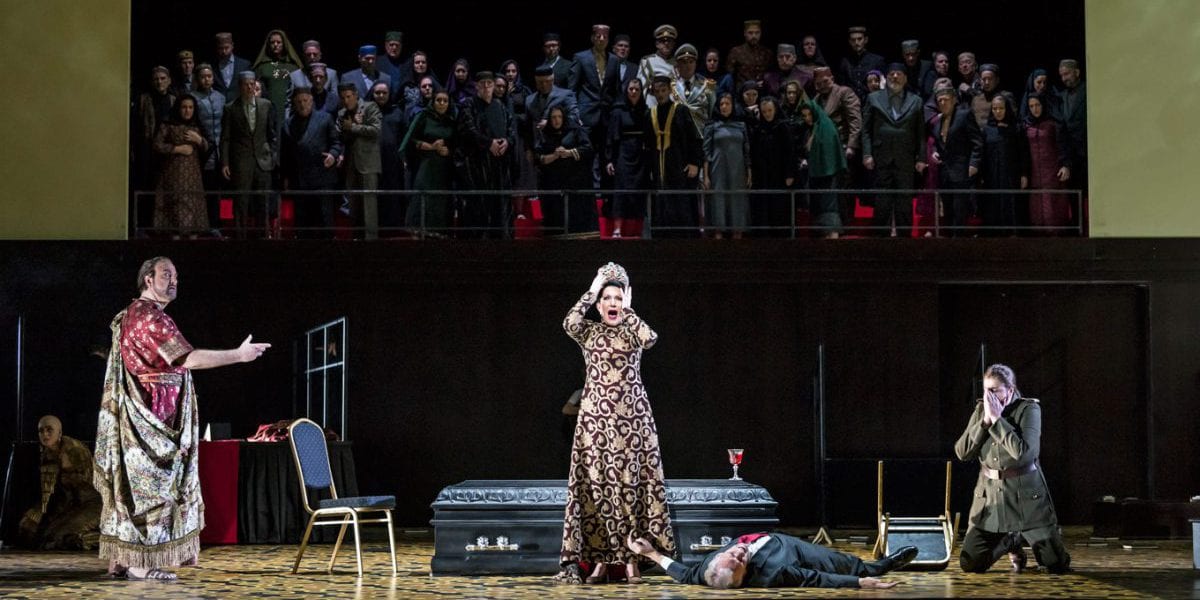Rossini loved food. A gourmand and gourmet after whom many dishes were named, one of the few times he is known to have shed tears was when he lost a picnic basket overboard. A close friend of the great chef Antonin Carême, some of his operas resemble this master’s great creations. This is no more true than in the case of Semiramide, a great multi-layered wobbling jelly of a work, into which every succulent device and tasty convention of the composer’s craft is crammed, but which impresses more in the individual quality of details than in the sprawling, over-extended structure of a two-act melodramma tragico.
This was the composer’s swansong in Italian opera and it stands as a tribute to the sophistication of his art: a long, complex, overture played here with great intensity by the orchestra, as if it were a movement that had escaped from Schubert’s 9th Symphony; an array of fearsome coloratura arias and duets for the two mezzo-soprano leads, dispatched with panache by DiDonato and Barcellona; a ‘mad scene’ that gives the baritone scope for the full gamut of hysteria; and a huge act one finale with a public oath, a corpse that walks as a ghost, and complex revelations of Oedipal connections that demand vengeance. All the tropes of opera seria are here on display and in a glittering palatial setting.
However, like a box of chocolates, after a while a slight sense of queasiness sets in. Each character, and above all the lead role, has wonderful dramatic and vocal opportunities to shine, but even when cut, as here, there are flat patches in the work when the note-spinning seems like dramatic plate-spinning instead. Especially in the first act very little happens, even when you allow for setting the scene, until the grand finale; and while the second half has more pace, the music now has in general a lower level of inspiration. It is the sort of work that might shine better as oratorio than opera, a candidate for the concert hall rather than automatically an opera for the stage.
That said, there was a feast of fine singing and playing on offer, and all testament to the fine tradition in Rossini performance that has developed during Pappano’s reign at the Royal Opera House, however controversial some of the stagings may have been. Like Miss Brodie, Joyce DiDonato is currently very much ‘in her prime’, and her vocal and dramatic heft makes her ideally suited to play a conflicted warrior queen, imperious in both politics and boudoir. The tests the composer sets for her are torrentially dispatched, and her acting ranges from the fiercely expressive through to the delicately restrained (as in the final scene). She is well matched in the other leads. Barcellona’s darker mezzo timbre blends well with DiDonato, and she portrays Arsace, son and potential love interest, with the feistiness one associates with Marilyn Horne, the best past interpreter of this role. As Assur, the queen’s rejected suitor, Mirco Palazzi uses a soft-grained tone with skill to portray the mental collapse of a wannabe swaggering dictator; and Lawrence Brownlee impressed throughout in the relatively minor role of an Indian King seeking a wife: in each of his two arias he delivered the fearsome top notes with fearless disdain.
David Alden’s design is a mixture of qualities. It was a bright idea to choose styles and interiors modelled on the oversized kitsch of recent or current dictatorships in the Middle and Far East; but sometimes the characters are left a bit stranded in vast hallways that are out of keeping with the intimacy of some of the action. A lurid palette of colours suits the costumes and lighting to the extremes of the action, and as usual both chorus and orchestra deliver their parts with vigour and delicacy, as required.

